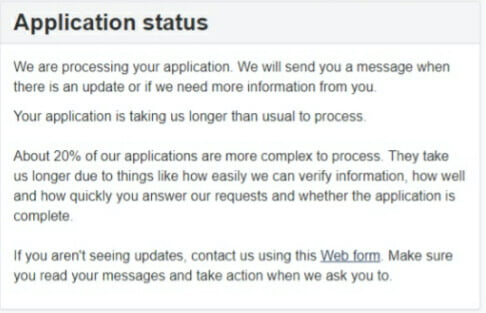According to IRCC the processing standard for applications sourced via Express Entry is six months for 80% of cases. Processing time is measured beginning from the day a complete application is received until a final decision is made by an immigration officer.
However, as per the latest available statistics IRCC did not meet the processing standard of finalizing 80% of all applications sourced via Express Entry within six months. The processing time for Express Entry overall was 21 months, reflecting the COVID-19 pandemic’s ongoing impact on IRCC’s operations and processing capacity.
How long does it take to process an Express Entry application?
This table displays the time, in months, that IRCC took to process 80% of applications under each program.
| Program | 2020 | 2021 | 2022 |
|---|---|---|---|
| Canadian Experience Class | 8 | 6 | 19 |
| Federal Skilled Worker | 18 | 28 | 29 |
| Provincial/Territorial Nominee | 11 | 21 | 13 |
| Federal Skilled Trades | — | 23 | 63 |
| All Programs | 10 | 8 | 21 |
Processing times refer to the time it took for 80% of applications to be finalized by IRCC. Processing times are based on July 1 to December 31 of each Year. Please note that a minimum of 10 cases are required to calculate processing times.
What happens after the expiry of the 6 month processing mark?
After the expiry of the 6 month processing mark, and when the progress bar reaches 100%, applicants are greeted with the following message;

It is worth noting that that the progress bar just shows the time elapsed from the day an application is submitted. It does not inform what stage or how far an application has been processed.
What’s happening with my file?
At this stage a frequently asked question from applicants is, What’s happening with my file? There are a number of ways to contact IRCC and check the status and these are explained in detail here. One of the quickest ways to get in touch with IRCC is to use the Web Form, also called Case Specific Enquiry or CSE. When communicating with IRCC, it is important to clearly explain your situation and provide all relevant details. Otherwise, you may receive information that is not accurate. Below are some examples of the type of response you may receive to your web form query.
- The eligibility verifications are currently valid.
- The criminal background verification is currently valid.
- The security background verification has not been initiated.
- The eligibility is currently valid.
- The criminal background verification is in process.
- The security background verification is currently valid.
- The eligibility review is complete.
- The security background verification is valid.
- The criminal background verification is valid.
As seen from the above examples atimes it can be difficult to fully understand and get a straightforward answer to your questions;
- What’s happening with my file?
- Is my Eligibility passed or still being reviewed?
- Is my Security Screening completed?
Understanding web form responses
Despite the ambiguity in web form responses there are enough cues in there that can help with understanding your application status. Here are some examples;
Similarly, if the web form response states “Eligibility review has been met” then it means that Eligibility has been Passed.
In conclusion
IRCC Web Form responses sometimes can be difficult to comprehend and don’t inspire confidence in knowing exactly where your application stands. Despite these shortcomings web form is one of the quickest ways (and it’s free) to contact IRCC about the status of your application. For many it may contain just enough information and/or indicators that is good enough to know that everything is in order. After all, there are many applicants who get their application approved without ever using a web form or GCMS.
So, go ahead and use the web form first and foremost before considering GCMS. You can always request your GCMS notes thereafter if needed.

